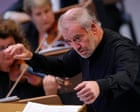
In recent days, the world of cultural and religious institutions has been at the forefront of public discourse as issues of leadership, accountability, and ethical responsibilities have come into focus. This comes through two significant stories, one involving a prominent Russian conductor scheduled to perform in Italy, and another concerning ongoing concerns around historical abuses within the Catholic Church in Belgium.
The first story unfolds in the scenic region of Campania, Italy, specifically at the historic site of La Reggia di Caserta, a former Bourbon palace and UNESCO World Heritage Site. Here, Valery Gergiev, a renowned Russian conductor with long-standing ties to Russian President Vladimir Putin, is poised to perform. This event marks Gergiev’s return to performing in Europe following Russia’s full-scale invasion of Ukraine. However, the impending concert has sparked a wave of calls for cancellation, led by the widow of the late Russian opposition leader, Alexei Navalny. Her appeal, along with voices from the broader community, highlights ongoing sensitivities and the complex interplay of politics, culture, and personal histories in a time of geopolitical tensions.
The narrative surrounding Gergiev not only sheds light on the individual’s close affiliations with political leadership but also evokes a broader reflection on the responsibilities of cultural figures in geopolitical conflicts. This is further accentuated by the significance of musical and artistic expressions afield and their role amidst global power dynamics, where culture can often cross borders more fluidly than politics.
Meanwhile, across the continent in Belgium, the focus shifts to the Catholic Church and its handling of historical sexual abuse allegations. Recently, two bishops visited Brussels, a continued gesture that ties back to Pope Francis’s promise during his September 2024 visit to address grievances from victims within the Catholic community. Many had hoped that these emissaries would signal progress or an advancement in reparations for the alleged abuses suffered by approximately two thousand individuals. However, disappointment has been expressed by the victims as the visit did not seem to yield substantial new steps towards reparations.
This ongoing struggle for justice and healing in Belgium highlights the critical importance of accountability and transparency within institutions of significant influence. The intersection of faith, institutional power, and personal trauma underscores the need for evolving conversations and reparative actions to build futures where trust and safety are reinforced.
Ultimately, these stories converge on a thematic thread of leadership and accountability. They prompt important questions about how leaders in both the cultural and spiritual arenas navigate their roles amid complex global challenges and societal expectations. As these discussions continue, they serve as poignant reminders of the collective responsibilities shared by leaders and institutions to foster environments that are principled, ethical, and considerate of those they impact. It is through such reflective and deliberate dialogues that societies can hope to advance towards more peaceful and equitable futures.
Source: {link}
